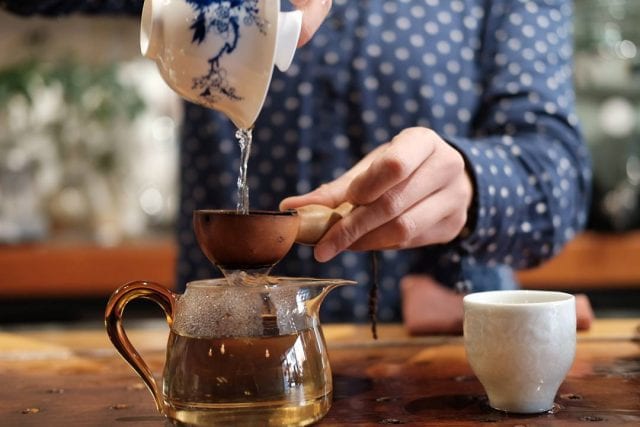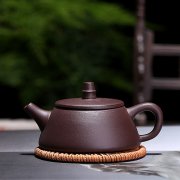What's the taste of the good Milan fragrant single fir tea? How to introduce the taste of Milan fragrant fir?
1. What is Huigan, as the name implies, is the process in which bitterness is transformed into sweetness in the mouth. This is a taste experience in the process of drinking Pu'er raw tea, because most Yunnan big-leaf Arbor tea already has a strong bitter taste, after bitterness, there is often a sweet taste in the mouth, this phenomenon is called Huigan. Unlike other kinds of tea, Pu'er raw tea generally lasts longer and easily penetrates into the throat, not limited to the tongue. 2. What makes a living refers to the secretion of saliva from the mouth, including the cheeks, the surface of the tongue and the bottom of the tongue. Sheng Jin in the mouth can quench thirst and soothe the mouth. When sub-health and physical discomfort, often feel dry mouth, throat locked. Only a healthy body has the ability to produce fluid naturally. Some Pu'er tea, Liubao tea and Hunan black tea are rich in connotation, so they have strong Shengjin function and make people comfortable. 3. What is throat rhyme is simply the feeling that the tea brings to the throat after drinking tea, such as moisturizing and relieving the tight hoop. Therefore, throat rhyme has always been the most favored by tea lovers, for more senior tea customers, throat rhyme is an important condition for them to evaluate the quality of tea. The throat rhyme of Pu'er tea can be divided into three aspects: sweet, moist and dry. Most of the tea with strong throat rhyme belongs to the tea full of Huigan. In other words, only after satisfying the taste stimulation in the mouth, the tea can go deep into the throat and even produce a feeling of fever in the esophagus and stomach. If the tea does not have a throat rhyme, after swallowing the tea, all feelings will end completely in the mouth. So sometimes we can hear some old tea customers point to their throats and say, "it feels like the tea is down here" after drinking good tea.

4, what is locked throat after tea, throat feel tight itching, too dry, swallowing difficulties and other uncomfortable feeling, can be collectively called throat locking. The quality of throat-locking tea is usually not very good. It locks the bottom of the throat, the upper jaw is dry, and the tongue is numb. It is recommended that you should avoid this kind of tea. 5. What is convergence? the word "convergence" is used by many people, but few people understand it. In fact, the convergence is related to the bitterness and astringency of tea, which is the intensity of the perception of time between bitter and astringent taste. The stronger the convergence of the tea, the bitter and astringent taste will be perceived to fade after entering the mouth, and the shorter the process of turning back to sweet will be; if the convergence is weak, the bitter taste will fade slowly in the mouth or continue the bitter taste in the mouth all the time. At the moment of the entrance of a tea, the bitter taste will be quickly sensed by the sensory organs of the mouth. How long will this feeling last in the mouth? It depends on the convergence of this tea. 6. What is the hanging cup in the hanging glass wine refers to the residual time of the liquid in the wall of the glass. The slower the liquid flows and the longer the hanging time is, the higher the sugar content in the wine is. The hanging cup mentioned when tasting tea does not refer to the time when the tea soup hangs on the wall of the cup, but the time when the aroma of tea stays on the wall of the cup. The longer the fragrance is, the longer the hanging cup is, the better the tea is.
Important Notice :
前街咖啡 FrontStreet Coffee has moved to new addredd:
FrontStreet Coffee Address: 315,Donghua East Road,GuangZhou
Tel:020 38364473
- Prev

American National Basketball Association superstar Jimmy Butler and Shopify co-founded the coffee brand!
Sounds like a joke. But it's true! NBA basketball star Jimmy Butler has officially launched a coffee brand! According to CNBC, the 32-year-old Miami Heat star launched his own coffee brand BIG FACE in Orlando, Florida, during the COVID-19 epidemic in 2020, and announced to join the creator of Shopify.
- Next

Song species yellow branch fragrant single fir tea with old purple teapot how to brew? How much water is suitable for soaking?
Purple teapot tea best, is a lot of tea friends know, but with what pot bubble, how to bubble, often there are many tea friends confused. In fact, there are some small details about what tea is made in the purple teapot. Today, we will know the six kinds of tea in the purple teapot. Green tea is not fermented tea, more common green tea
Related
- Unexpected! Ruixing Telunsu lattes use a smoothie machine to foam milk?!
- % Arabia's first store in Henan opens into the village?! Netizen: Thought it was P's
- Does an authentic standard mocha coffee recipe use chocolate sauce or powder? Mocha Latte/Dirty Coffee/Salty Mocha Coffee Recipe Share!
- What is the difference between Vietnam egg coffee and Norway egg coffee? Hand-brewed single product coffee filter paper filter cloth filter flat solution!
- What is the difference between sun-cured and honey-treated coffee? What are the differences in the flavor characteristics of sun-honey coffee?
- How to make Italian latte! How much milk does a standard latte use/what should the ratio of coffee to milk be?
- How to make butter American/butter latte/butter Dirty coffee? Is hand-brewed coffee good with butter?
- Is Dirty the cold version of Australian White? What is the difference between dirty coffee/decent coffee and Australian white espresso?
- Relationship between brewing time and coffee extraction parameters How to make the brewing time fall to 2 minutes?
- Got entangled?! Lucky opens a new store, Mixue Ice City, and pursues it as a neighbor!

